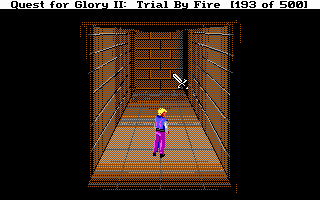Simulationfags cannot into abstraction

I can into abstraction. But there is little point in abstracting results of things you're doing explicitly in game.
There is also the big problem that if you get XP rewards from quests, then instead of taking quests at their value - how will they benefit you or what other reasons you may to do them, you start to think of them as "omg moar xp giev nao!". That's plain bad design and it encourages moronic behaviour on player's part:
-howdy stranger, could you travel to the dread caves of Murderkill and bring me a moderately sized sack of goblin testicles? I can't really reward you for this, despite the journey being perilous, supplies costly and goblins vicious, but I would be
really grateful.
And the player responds with:
-OMG YES! I ALWAYS DREAMED OF GETTING REPEATEDLY STABBED WITH NUMEROUS RUSTY SPEARS IN ORDER TO SELFLESSLY HARVEST FILTHY GOBLIN BALLSACKS! SWEET XP - HERE I COME!
But time in this game is a meaningless resource.
Problem #1 identified.
Finally, it's not like XP systems aren't hopelessly broken - they are kill-centric, there is no tie between abilities improving and playstyle,
Bloodlines only gave points for completing quests IIRC.
And that's the better way of making XP-based system. The problem is that in such system character development bears no relation to character's actions.
Another problem is that it may still lead to goblin testicles.
any XP rewards that aren't obtained from combat have to be scripted, which means no freeform problem solving, etc.
Combat XP rewards have to be scripted too.
How? If a wolf is worth 50xp, then any wolf is worth 50xp. You don't have to script this, you just place or generate wolves.
There's no reason why you can't have freeform problem solving with an xp system.
Actually, you're right, but you can have freeform problem solving IF AND ONLY IF you're rewarded with XP for goal completion alone. In any other case you get scripted XP rewards for doing stuff in predefined ways and no reward for doing something creative.
Heroes of might and magic 4 gave your hero experience for sneaking past creatures for example.
Using predefined option in predefined way is not freeform problem solving.
Speech skills: give experience for successful persuasion (like fallout 3/nv do, as well as for hacking/lockpicking). More xp for more difficult tasks.
Sneak: give xp while successfully sneaking around creatures, with creatures more likely to catch you providing more xp.
Any method that would raise a skill in an improve by using system can be used to give general xp in an xp system.
This gives you all caveats of use based but without any of its upsides.
Good job!

Combat skills will increase naturally through gameplay in a game where you kill stuff all the time.
One of chief advantages here is making a game where you don't have to kill stuff to grow in power.
But pickpocketing? Alchemy? Enchanting? Crafting? Illusion magic? There's pretty much no risk involved in doing any of those things, meaning that you can grind them as much as you want to
Let's see - pickpocketing confers obvious risks, alchemy should require at least some expensive ingredients, enchanting and crafting can be balanced through costs, illusion can be made context dependent (for example leveling from invisibility only when you do stuff you don't want to be seen doing while potentially visible) and not liked by NPCs (hell it's mostly used to screw with people's minds and concealing yourself - hard to think of a non-illicit use of it by a random adventurer in a city).
Additionally, a lot of problems are caused by reloading and should be fought accordingly - by discouraging reloads or bypassing reload ability.
For example illicit activity could be detectable not only immediately, but some time after (an NPC "remembers" that you bumped into them in the market earlier this day after he notices his coinpurse gone even unseen murder can be investigated successfully later on, etc.), potions could be only properly identified by drinking or otherwise destroying them (shitty alchemist may notice that his hombrew healing elixir is in fact an explosive potion, or that the cure disease potion sold to some guy killed him instead making alchemist wanted by law) - player won't be as eager to reload several h old save as he would be to reload several s old save.
And that's on top of basic grind-proofing I've proposed.
Athletics isn't a pointless or stupid skill because how fast you can move is extremely important for any close combat character.
No, it's a pointless skill, because it has no success/failure checks.
Movement speed can still be handled meaningfully by attributes. Same with jumping and landing.



















